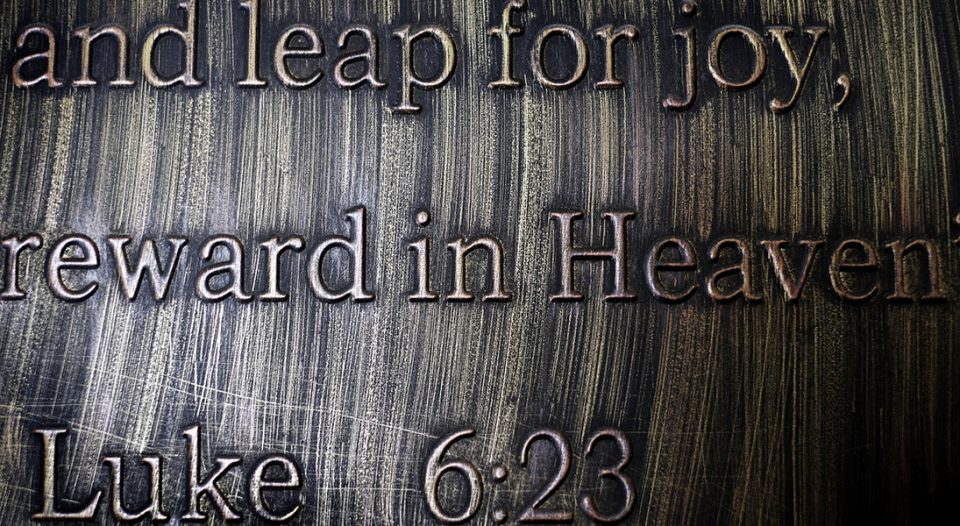Lectionary for Feb. 13, 2022
Sixth Sunday after Epiphany
Jeremiah 17:5-10; Psalm 1;
1 Corinthians 15:12-20; Luke 6:17-26
Social media isn’t always a healthy place to hang out. Frequently, I find that I read through conflicts that “generate much more heat than light,” as my brother would say. One of those perennial conflicts seems to occur between Christians over where to focus our energy and attention. Some of our siblings focus on heaven and how Jesus has saved us for life in the world to come after the resurrection. Others focus on the here-and-now, trying to align our bodies with our prayers that God’s kingdom should come and that God’s will should be done on earth as it is in heaven. As is frequently the case, I think the body of Christ needs both perspectives. This week’s Scripture readings show us why.
We turn this week to Jesus’ sermon on the plain in Luke 6. This speech has several important similarities with, and interesting differences from, the Sermon on the Mount in Matthew. I argue that we should regard these sections as Jesus’ stump speech. Today’s politicians, stand-up comedians and traveling evangelists who frequently speak to large crowds in different locations have core material that they use and adapt for particular audiences. These sermon sections from the Gospels, especially as they overlap, probably represent Jesus’ core teaching message that he shared with crowds on both mountains and in level places. Accordingly, we should pay particular attention to these words, which were at the center of his years of public ministry.
The crowds on the plain came from not only Judea but also Trye and Sidon. Jesus spoke to a mixed Jewish and gentile crowd after healing their diseases and cleansing the people of unclean spirits (Luke 6:17-18). As seems to have been his usual practice, he began his sermon with counterintuitive blessings. In this preaching event, Jesus made sure everyone knew that he wasn’t talking about abstract poor, hungry, sad or mistreated people but specifically about those in the crowd. He said to them: “Yours is the kingdom of God … you will be filled … you will laugh … your reward is great in heaven” (20-23). He also spoke in the second person to people in the crowd who faced an unpleasant future judgment because they were already rich, well-fed, boisterous or well-respected (24-26).
Make no mistake, Jesus was talking about rewards in heaven (23). He was certainly calling the people to regard current suffering or ease with an eternal perspective.
But are we to understand that we should only look forward to heaven and neglect trying to change unjust circumstances on earth? I don’t think so, precisely because of the reason Jesus gave for pronouncing happiness or woe. Jesus based his pronouncements on how prior analogues treated the prophets. The poor, hungry, sad and excluded knew how the prophets felt (23). The rich, well-fed, delighted and respectable had more in common with the false prophets who prophesied prosperity, ease and national glory (26).
He said to them: “Yours is the kingdom of God … you will be filled … you will laugh … your reward is great in heaven.”
Any serious reading of Isaiah, Jeremiah and the rest reveals an ongoing, major theme of prophetic calls to communal repentance. That is, the prophet’s task was to warn that things weren’t right and to urge people to turn from evil actions and systems and instead follow God’s call to love the Lord and the neighbor. Jeremiah insisted that relying on humans and trusting in the wisdom of humanity led to an existence as fruitless and dry as a bush in the desert. But the one who trusts in the Lord is like a well-watered tree (Jeremiah 17:5-8). This doesn’t mean waiting until heaven for things to be made right but trying to change the here and now!
Surely pursuing wealth, prosperity and an abundance of food is the wisdom we hear from every quarter, right? Being respected and well-thought of is basically the whole goal of social media, right? And yet, Jesus says that those who go without and don’t receive near-universal acclaim are the people who are truly happy. And they are happy specifically because they share an experience—with the prophets, and with Jesus himself—of being ostracized, excluded and even persecuted by those who think they know better.
Jesus, and the prophets before him, counted on God making things right in the world to come or in the last day. But they also argued powerfully that our actions matter deeply to God and that righteousness matters. Their decrying of evil systems and their inability to go along to get along led to their suffering at the hands of the corrupt. Jesus calls us to this siblinghood of the suffering and rising Messiah. It is the only body truly worth belonging to. And that is as true in this world as it is in heaven to come.





